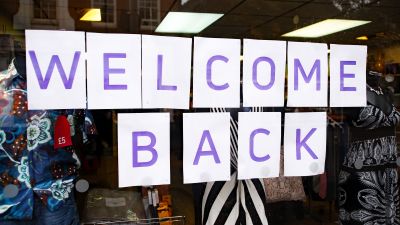What can I take to charity shops now they are open?

Charity shops are preparing for a surge in donations when they are allowed to reopen next week (April 12).
Millions of people have used the recent lockdown as an opportunity to clear out their homes and charities say they're expecting more donations as a result. However, many are worried about not having enough volunteers in their shops to cope.
ITV Central's Mark Kielesz-Levine has been speaking to charity shops in the Midlands about the recruitment crisis:
Charity shops are classed as non-essential, so all stores have been closed to customers since the start of this year. However, during a briefing at the weekend, Prime Minister Boris Johnson gave the green light for all non-essential shops to reopen from April 12.
Now, charity shops are asking people to follow simple steps to ensure that their stores and volunteers aren't overwhelmed by the volume of donations.
Top tips for donating:
Clean things. Wherever possible, put clothes and textiles through the washing machine and wipe down solid surfaces.
Have a think about what items will sell. Ask yourself, “Would someone I know buy this?” If the answer is “Yes”, charities would love to receive it.
Stagger your donations, rather than bringing everything at once. And remember to bring your donations in bags or boxes which you don’t want back.
Remember to Gift Aid your donation. This scheme allows charities to claim 25% extra on the sale of your donations.
People are also being urged to check the list of approved items to donate because charity shops are not allowed to sell certain items.
What you can donate:
Good quality, clean clothing and shoes (including vintage and retro items, and even bras!)
Bags and accessories
Valuable items
Books
Music (CDs, vinyl, DVDs, Blu-rays, musical instruments and sheet music)
Homewares: china, kitchenware, ornaments, pictures, collectables
Soft furnishings: small rugs, linen, curtains (must be clean and in good condition)
Knitted items and blankets
Toys and games
Wedding dresses and accessories
Mobile phones
Furniture
Stamps (including used stamps) and coins
Items most shops CAN'T accept:
Electrical goods that run off the mains (a few shops do accept these, so please check before donating)
Medical equipment
Anything broken, dirty, incomplete or unsafe
Single computers (but charities would be happy to hear from your company if you would like to donate multiple units)
White goods (cookers, washing machines etc)
Safety headgear (e.g. motorcycle crash helmets)
Identifiable work/school uniforms
There are some other items that charities cannot sell for safety or legal reasons. If in doubt, please ask your local shop before donating.
The decision to allow non-essential shops to reopen is a huge relief for many charities, as the sector has had its income hit hard by cancelled fundraising events and shop closures. An exclusive investigation by ITV News uncovered funding problems all over the UK - with around 20% of small charities saying their income had been halved. Around 1 in 5 are expecting to make job cuts.
Last year, the Digital, Culture, Media and Sport (DCMS) Committee also warned that reopening charity shops would not be enough to save the stricken sector. Despite the government giving an extra £750 million to frontline charities, experts say the funding gap is more like £10 billion.
Read more: